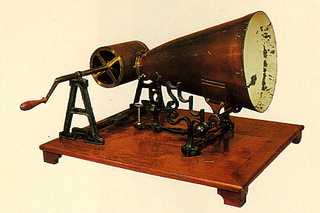Prognostication and the Failure of the Web
For almost as long as there has been a Web to write about, people have been prognosticating the death of the Web. Mine is a different kind of prediction, but as I look into my crystal ball, I'm absolutely certain of it: The Web will fail. Let me tell you what I see through the glass...
A Story of Failure
 A Photo of Scott's phonautograph on display in the Smithsonian
A Photo of Scott's phonautograph on display in the Smithsonian
In school, most of us learn to associate the recording of sound with Thomas Edison who invented the phonograph in 1877. What a lot of people don't know, however, is that two decades before Edison, a man named Édouard-Léon Scott de Martinville invented, used and patented a means for recording sound waves. The "phonautograph," as he called it, used vibrations from a brush to capture the sound waves from within a cone to make lines on soot covered paper as it passed along a rotating drum.
If you've never heard of the phonautograph, you're probably thinking "wow... that's amazing!? How did one play it back?" Of course, that's a natural question. What could be more natural? So you'll probably be shocked to learn "you couldn't".
Let that sink in for a moment. The man invented a sound recorder that couldn't be played back.
Why would someone even invent such a thing? To understand that, you'll have to some mental gymnastics and put yourself back in Scott's world. Until that time, people had been recording things for thousands of years - by writing it down. Sound was an expression of thoughts from your brain, through your voice. There were lots of alphabets and even things like stenography which Scott had studied that made it more efficient. Words were made of phonemes. In all these cases, by transforming the phonemes into an alphabet, our brain learned to make sense of these markings via our eyes, rather than our ears.
Scott just assumed that if he could manage to get the soundwaves "written down" then people could just learn to "read" soundwaves. He spent a lot of time on this, and, in terms of reaching his proposed destination, he failed kind of epicly: You can't read soundwaves with your eyes.
Except that, as we see from this vantage point, he didn't. While he couldn't even see or conceive of "playback," his work enabled others to see further. As a side note - many many years later, when we got to where we have computers that could be made to 'read' a sound wave, a team actually did just that and 'played back' some of Scott's recordings. The quality is pretty terrible, as you might expect, but it is undeniable that he was successfully recording.
Our Inability To See the Future
Our ability to see the future is, as we just saw, very tied to our place in time and our current perspective. Very frequently, in trying to solve one problem, we are affecting another. If we measure "failure" by intent to complete what we set out to do, it's truly astonishing how much around us that we'd typically view as huge success was actually rooted in "failure". When he created sound recording and playback, Edison imagined that people would use it for correspondence. Again, his world was a world of writing and mail. He prognosticated that a fine and probably common use of his technology would be for someone to record a "letter" and pop it in the mail. When Bell invented the telephone he imagined that it might be used to pipe music from a performance to an audience remotely. When people got their hands on both, they were basically used inversely. Meanwhile, Lee de Forest who helped pioneer AM radio, had imagined something so different that he sent a letter to National Association of Broadcasters saying ""What have you done with my child, the radio broadcast? You have debased this child, dressed him in rags of ragtime, tatters of jive and boogie-woogie." Ever used super glue? That isn't what he was trying to invent. Not remotely.
Have a look-see here...
Sir Tim Berners-Lee thinks that if we can predict what the internet will look like in 20 years, than we are not creative enough. #www2016
— Dragan Milchevski (@Agandrau) April 13, 2016
That's pretty relevant because in many ways the Web today is hardly what Tim Berners-Lee was trying to accomplish at all. Tim imagined that browsers would be equal parts authoring environments and that the Web would be a very two-way medium. Instead, it has been until recently, very one way. And it still isn't a real editing environment as imagined. Tim imagined annotations, we've still not got those, really. In fact, some early browsers had them and took them out. Tim didn't initially see scripting, nor CSS nor HTML being the content so much. His initial use case was research, yet still, I can't find most scientific research available in HTML format. By the measure of accomplishing the goals of the time, the Web is kind of a failure... But is it? No way.
Failure vs Death
he death of the Web would mean it was over, done. But failure is something different, or at least it can be. Failure can be good. It's necessary even. If you are capable of seeing or hearing this post, it's only the result of millions of failures in DNA and the consequence of a process with no long-term vision at all - just an inherent bias toward not dying long enough to reproduce.
But the really interesting thing to note is that this is possible only because failures breed opportunity. The entire universe (but especially humanity) seems very adept at finding opportunity and exploiting it. The general trend then is usually, at least from the perspective of those viewing it, "up" as we capitalize on an increasing number of opportunities.
By these measures, the Web already is a spectacular failure. Emphasis on the word "spectacular". It's absolutely great in some ways, but not quite exactly as intended in the first draft. Even Tim's vision of what the Web could, should or might possibly be is affected by what's all around.
Seeing the difference between the two (death and failure), however, kind of matters. The reason that the Web isn't going to die, in my opinion, is that it is learning this lesson. All of the major Web Standards Bodies have "adopted" the Extensible Web Manifesto and they're hard at work taking the stuff that works and just exposing more opportunity DNA. The W3C Technical Architecture Group (TAG) is helping to make sure that W3C projects keep this in mind and don't go off the track with spec reviews and community and working group-coordinated efforts like The Extensible Web Report Card and task forces like Houdini. Friends at the WHATWG are doing lots of hard work explaining nitty-gritty details and getting those hard last-mile agreements on ideas like Streams and Fetch. ECMA provides prollyfills and transpilers before specs are finished and accepts feedback The W3C Web Incubator Community Group provides a place for lots of ideas from anywhere to take root, be discussed, prollyfilled and, frequently usefully used before they take deep roots in standards... And importantly to fail. It offers value along the way and provides new opportunities, which begin to let us see the future more clearly. Finally, the W3C Advisory Board (AB) is working on changes to the W3C Process which would require all of the things to be incubated.
I think that the Web has a bright and vibrant future ahead, full of beautiful failures.
Note, if you enjoyed the stories of failure in this piece, I'd highly recommend "How We Got to Now: Six Innovations That Made the Modern World" by Steven Johnson.

 This awesome stock art depicting me predicting failure thanks to http://obliviate-stock.deviantart.com/
This awesome stock art depicting me predicting failure thanks to http://obliviate-stock.deviantart.com/